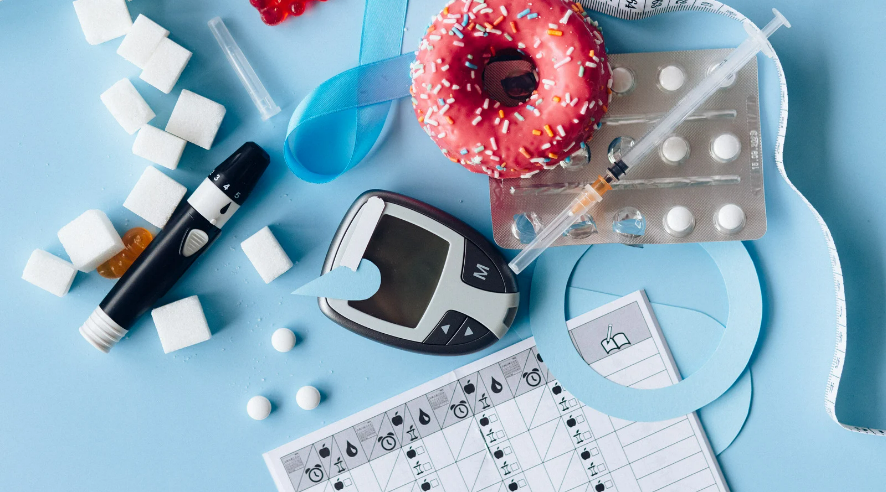Managing Diabetes: Lifehacks for a Healthier Life
- 19 October 2022

Diabetes is a chronic condition that affects millions of people worldwide. It is characterized by high levels of glucose (sugar) in the blood, which can cause serious health problems if left untreated. However, with the right lifestyle changes and treatments, it is possible to manage diabetes effectively and live a full, healthy life.
The first step in managing diabetes is understanding what it is and how it affects the body. Diabetes occurs when the body is unable to produce enough insulin, the hormone that regulates glucose levels, or when the body's cells become resistant to insulin. This leads to high levels of glucose in the blood, which can damage the blood vessels, nerves, and other tissues.
In order to manage diabetes, it is important to adopt a healthy lifestyle that includes a balanced diet and regular exercise. A diet that is low in sugar and processed foods, and high in fiber and nutrients, can help regulate glucose levels and improve overall health. Similarly, physical activity can improve insulin sensitivity and blood glucose control, and reduce the risk of developing related health problems.
Another important aspect of managing diabetes is monitoring glucose levels regularly. This can be done through self-monitoring of blood glucose (SMBG), which involves regularly testing the blood to determine glucose levels. There are various types of glucose meters available, each with its own features and benefits, so it is important to choose one that works best for your needs.
Medications and insulin therapy are also important tools for managing diabetes. There are several different types of medications available, each with its own benefits and side effects, so it is important to work closely with a doctor to find the best option for you. In some cases, insulin therapy may also be necessary to regulate glucose levels.
In addition to lifestyle changes and treatments, it is important to educate yourself about diabetes and its related health problems. This includes learning about symptoms, causes, and risk factors, as well as the effects of the condition on various parts of the body. Understanding diabetes can help you make informed decisions about your health and take steps to prevent or manage related health problems.
Finally, it is important to seek support from family, friends, and healthcare professionals. This can include joining a support group, seeking advice from a doctor or dietitian, or simply talking to someone who understands what you are going through. Having a support system in place can help you manage diabetes effectively and live a full, healthy life.
Points to Manage Diabetes Effectively:
- A balanced diet: A diet that is low in sugar and processed foods, and high in fiber and nutrients, is crucial for managing diabetes. This can help regulate glucose levels, maintain a healthy weight, and reduce the risk of developing related health problems. Some specific dietary recommendations for diabetes include:
- Eating plenty of vegetables and fruits
- Incorporating healthy sources of protein, such as lean meat, poultry, fish, beans, and tofu
- Choosing whole grain products over processed foods
- Limiting saturated and trans fats
- Controlling portion sizes - Regular exercise: Physical activity can help regulate glucose levels and improve insulin sensitivity, reducing the risk of developing related health problems. It is recommended to engage in at least 30 minutes of moderate physical activity, such as brisk walking, every day.
- Monitoring glucose levels: Regular monitoring of glucose levels through self-monitoring of blood glucose (SMBG) is important for managing diabetes. It helps track the effects of diet, exercise, and medications on glucose levels, and can alert you to any potential issues that need to be addressed.
- Medications and insulin therapy: Medications and insulin therapy can help regulate glucose levels and reduce the risk of related health problems. There are several types of medications and insulin therapies available, and it is important to work closely with a doctor to find the best option for you.
- Education: Understanding diabetes and its related health problems is important for making informed decisions about your health and preventing or managing related health problems. This includes learning about symptoms, causes, and risk factors, as well as the effects of the condition on various parts of the body.
- Support: Seeking support from family, friends, and healthcare professionals is important for managing diabetes effectively. This can include joining a support group, seeking advice from a doctor or dietitian, or simply talking to someone who understands what you are going through. Having a support system in place can provide motivation and help you stay on track with your diabetes management plan.
In conclusion, managing diabetes requires a combination of lifestyle changes, treatments, and self-care. By understanding the condition, adopting a healthy lifestyle, monitoring glucose levels, seeking support, and educating yourself, it is possible to live a full, healthy life with diabetes. Remember, with the right tools and support, anything is possible.




